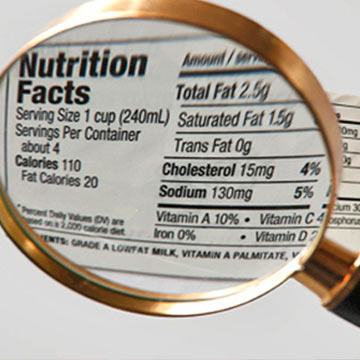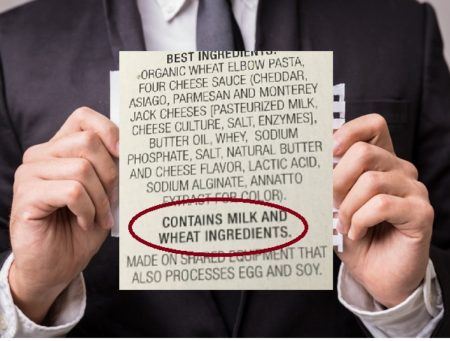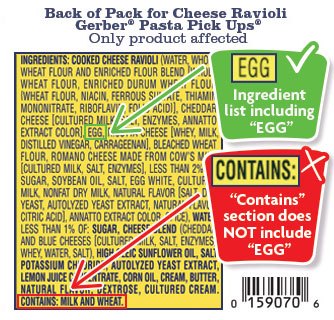Recalls due to Labeling Mistakes – The #1 Reason for Food Recalls
Although there was an extremely high number of recalls due to Listeria monocytogenes in the past three m onths, the majority of the FDA recalls were due to allergens many caused by mislabeling. Undeclared allergens accounted for about 90% of labeling related recalls.
onths, the majority of the FDA recalls were due to allergens many caused by mislabeling. Undeclared allergens accounted for about 90% of labeling related recalls.
The Food Allergen Labeling and Consumer Protection Act of 2004 requires that packaged food labels include declarations of the eight major food allergens: eggs, milk, wheat, peanuts, soybeans, tree nuts, fish and crustacean shellfish.
Allergens are unique in food safety as they are not contaminants like Salmonellaor Listeria, but can be still dangerous to susceptible individuals. The sole protection for allergic individuals is the product label. For that reason, the product label can cause an allergic reaction if allergen goes undeclared.
According to the FDA, most allergen-related recalls are for bakery products, followed by snacks, candies, dairy, and dressing. Most of the recalls due to allergens are for milk, wheat, and soy.
Potential Reasons for Allergen-related Mislabeling
Mislabeling of food products are resulting in recalls. These recalls are caused by the use of the wrong package or an incorrect label. A product might be contaminated by an unintended in gredient, causing it to be recalled. Recalls can happen when processors inadvertently put the wrong label on products.
gredient, causing it to be recalled. Recalls can happen when processors inadvertently put the wrong label on products.
When packages look similar it might be possible for an employee to take the erroneous package, label, or roll of film, especially when in a rush. It might also be difficult for employees to distinguish packages or labels when they are handled in bulk.
Another cause of allergen recalls is the use of the wrong terminology in the ingredient list, or the allergen “contains” statement or not to include it in both (ingredient list and “contains”). For example, a product might declare the presence of flour but not wheat, or the presence of tree nuts but not include a particular type of nut.
Another reason for a recall is an undeclared allergen that does not show on the label. In the creation of the label, it is sometimes easy to fail to see the presence of “hidden allergens” that can be a part of an ingredient. For instance, gluten might be “hidden“ in soy-sauce originating from a minor amount of wheat.
Vigilance and accurate supplier ingredient specifications are crucial, particularly when formatting label information for products that contain composite ingredients.
Sometimes an ingredient supplier reformulates its product and fails to notify the customers down the chain about the addition or substitution of allergens or such a notification gets lost.
Recent Examples of Recalls
Recent recalls show that even if a product itself is manufactured correctly, a failure to get the packaging and labeling right can cause a full-scale recall.
Clif Bar & Company recalled a variety of bars because they may have contained undeclared peanuts. The company received a small number of consumer complaints alleging peanut or tree nut allergic reactions. There are no confirmed illnesses associated with it.
Raja Foods LLC of Skokie, Il recalled “ANARKALI PESHAWARI NAAN” because it may have contained milk that was undeclared on the package. One illness has been reported to date.
St Louis-based Dierbergs recalled various Deli Products with multiple uses by dates because of undeclared fish (anchovy) in a Caesar dressing and undeclared milk in 2 Santa Fe wraps. Global Lamsheng Kee Inc., Brooklyn, NY recalled Frozen Fish Tofu, Frozen Fried Fish Ball, and Frozen White Fish Ball because they may have contained undeclared egg.
FC International Inc. of Los Angeles, CA recalled a rice seasoning product because it was found to be missing the English Product Label.
Slade Gorton, Boston, MA recalled several Tilapia products because they may have contained undeclared milk since the fish was dusted with flour containing milk. Slade Gorton was notified by its breading vendor, Newly Weds Foods, Inc., that the pre-dust and breading it supplied to Slade Gorton & Co., Inc. may have contained milk.

Gerber Products CompanyofFlorham Park, New Jersey,recalled Cheese Ravioli Gerber® Pasta Pick-Ups® because the egg allergen is missing from the “Contains” statement. While “egg” is listed as an ingredient in the full ingredient list but is missing from the section “Contains” that is designed to alert parents to allergens in the recipe (see figure).
What Have we Learned?
Undeclared allergens is a major recall reason, accounting for more recalls than all food pathogens together in the last three months. Simple problems that could have been avoided caused a lot of these recalls.
A way to keep computer labels up-to-date- is the use of an emerging technology that can assign a bar code to each ingredient, which can be utilized to scan the ingredients as they are being added to a mixer.
To avoid recalls due to allergens, it is important to control packaging picking and to have a robust label control system. Most packaging mistakes are caused by human errors, predominantly during the manual setup of packaging line equipment. Many of these errors such as entering an incorrect date code, use of the wrong label, a packaging print error or placing the product in the wrong package can be easily avoided.Although there was an extremely high number of recalls due to Listeria monocytogenes in the past three m onths, the majority of the FDA recalls were due to allergens many caused by mislabeling. Undeclared allergens accounted for about 90% of labeling related recalls.
onths, the majority of the FDA recalls were due to allergens many caused by mislabeling. Undeclared allergens accounted for about 90% of labeling related recalls.
The Food Allergen Labeling and Consumer Protection Act of 2004 requires that packaged food labels include declarations of the eight major food allergens: eggs, milk, wheat, peanuts, soybeans, tree nuts, fish and crustacean shellfish.
Allergens are unique in food safety as they are not contaminants like Salmonellaor Listeria, but can be still dangerous to susceptible individuals. The sole protection for allergic individuals is the product label. For that reason, the product label can cause an allergic reaction if allergen goes undeclared.
According to the FDA, most allergen-related recalls are for bakery products, followed by snacks, candies, dairy, and dressing. Most of the recalls due to allergens are for milk, wheat, and soy.
Potential Reasons for Allergen-related Mislabeling
Mislabeling of food products are resulting in recalls. These recalls are caused by the use of the wrong package or an incorrect label. A product might be contaminated by an unintended in gredient, causing it to be recalled. Recalls can happen when processors inadvertently put the wrong label on products.
gredient, causing it to be recalled. Recalls can happen when processors inadvertently put the wrong label on products.
When packages look similar it might be possible for an employee to take the erroneous package, label, or roll of film, especially when in a rush. It might also be difficult for employees to distinguish packages or labels when they are handled in bulk.
Another cause of allergen recalls is the use of the wrong terminology in the ingredient list, or the allergen “contains” statement or not to include it in both (ingredient list and “contains”). For example, a product might declare the presence of flour but not wheat, or the presence of tree nuts but not include a particular type of nut.
Another reason for a recall is an undeclared allergen that does not show on the label. In the creation of the label, it is sometimes easy to fail to see the presence of “hidden allergens” that can be a part of an ingredient. For instance, gluten might be “hidden“ in soy-sauce originating from a minor amount of wheat.
Vigilance and accurate supplier ingredient specifications are crucial, particularly when formatting label information for products that contain composite ingredients.
Sometimes an ingredient supplier reformulates its product and fails to notify the customers down the chain about the addition or substitution of allergens or such a notification gets lost.
Recent Examples of Recalls
Recent recalls show that even if a product itself is manufactured correctly, a failure to get the packaging and labeling right can cause a full-scale recall.
Clif Bar & Company recalled a variety of bars because they may have contained undeclared peanuts. The company received a small number of consumer complaints alleging peanut or tree nut allergic reactions. There are no confirmed illnesses associated with it.
Raja Foods LLC of Skokie, Il recalled “ANARKALI PESHAWARI NAAN” because it may have contained milk that was undeclared on the package. One illness has been reported to date.
St Louis-based Dierbergs recalled various Deli Products with multiple uses by dates because of undeclared fish (anchovy) in a Caesar dressing and undeclared milk in 2 Santa Fe wraps. Global Lamsheng Kee Inc., Brooklyn, NY recalled Frozen Fish Tofu, Frozen Fried Fish Ball, and Frozen White Fish Ball because they may have contained undeclared egg.
FC International Inc. of Los Angeles, CA recalled a rice seasoning product because it was found to be missing the English Product Label.
Slade Gorton, Boston, MA recalled several Tilapia products because they may have contained undeclared milk since the fish was dusted with flour containing milk. Slade Gorton was notified by its breading vendor, Newly Weds Foods, Inc., that the pre-dust and breading it supplied to Slade Gorton & Co., Inc. may have contained milk.

Gerber Products CompanyofFlorham Park, New Jersey,recalled Cheese Ravioli Gerber® Pasta Pick-Ups® because the egg allergen is missing from the “Contains” statement. While “egg” is listed as an ingredient in the full ingredient list but is missing from the section “Contains” that is designed to alert parents to allergens in the recipe (see figure).
What Have we Learned?
Undeclared allergens is a major recall reason, accounting for more recalls than all food pathogens together in the last three months. Simple problems that could have been avoided caused a lot of these recalls.
A way to keep computer labels up-to-date- is the use of an emerging technology that can assign a bar code to each ingredient, which can be utilized to scan the ingredients as they are being added to a mixer.
To avoid recalls due to allergens, it is important to control packaging picking and to have a robust label control system. Most packaging mistakes are caused by human errors, predominantly during the manual setup of packaging line equipment. Many of these errors such as entering an incorrect date code, use of the wrong label, a packaging print error or placing the product in the wrong package can be easily avoided.
